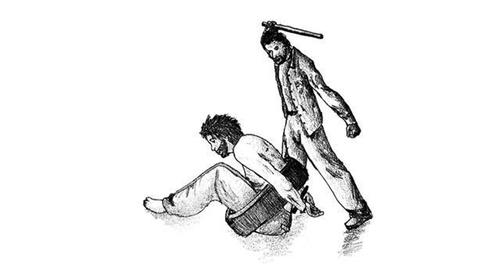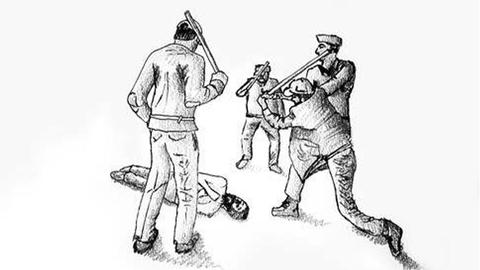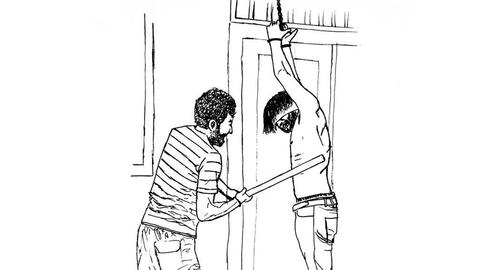To the tune of a song, the lyrics of which are "The journey begins, and oh, how I fear its end," a driver escorted brothers Michel and Raymond Sweidan from Beirut to Damascus. Raymond repeats the lyrics of the song while talking to me, entirely calm, as if reflecting on each word.
"The driver was playing the track on repeat, as if he was telling us what was to come,” Raymond says.
Beginning at the Beau Rivage Hotel in Lebanon and ending in Mezze in Syria, it was a journey that lasted several years. Raymond, who was part of the Lebanese army, remembers it clearly: "The pain that my time being detained [by Syrian authorities] caused me will stay with me until the day I die. I was a member of the military establishment when a Lebanese army officer arrested me because of my opposition to the Syrian presence in Lebanon."
Raymond did not open up about his experiences as a prisoner until after his brother video called me to verify my identity. His hesitation was a clear sign – either of fear or of needing to take precautions as a result of his detention.
Raymond had not been afraid to fight with the Lebanese Forces Party, to which he belonged, in the battles that took place in Lebanon against the Syrian party that entered Lebanon. Syria had moved into Lebanon under the name of the Arab Deterrent Forces shortly after the end of the Lebanese Civil War, in 1990, in addition to other internal battles.
Raymond had studied business administration at the Lebanese University. After the Civil War, when the Lebanese Forces Party disarmed itself and was disbanded, he joined the Lebanese Army.
Methods of Torture
Raymond says: "I was arrested on the afternoon of August 13, 1993 and taken to the Beau Rivage area where there was a building for the Syrian army at the time. After that, my brother Michel was taken from the Ashrafieh area where we lived, to the same place. Rustam Ghazali [a Syrian military and intelligence officer] interrogated me on charges of being involved in the coup against the Lebanese state and incitement against a brotherly regime.”
Syria’s involvement in Lebanon in the 1990s had effectively turned it into a client state – the so-called “brotherly regime” referred to by Ghazali during Raymond’s interrogations.
Raymond composure’s broke while talking about the types of torture he endured, his trembling voice and the lump in his throat being enough to describe it.
“It was the first time that I was put on the wheel,” a form of torture involving folding a person’s legs and head within a wheel. “t was not at all easy to see my brother and him see me while we were being beaten."
From the Beau Rivage, Raymond and his brother Michel were taken to the Anjar region of Lebanon, specifically to Prophet Joseph's point.
"There, I was accused of working with Israel. Nothing was easier than sticking the charge of dealing with Israel on the Lebanese. They accused me of working as a guide for the Israelis during the Israeli invasion of Lebanon in 1982. At that time, I was only 12 years old. I told them I was only a child then, but they did not believe me. They tortured me with the German Chair, the Flying Carpet,” Raymond said, referring to a form of torture where a victim is strapped to a chair that is adjusted to inflict pain on the spine, and another form of inflicting pain on the spine by strapping a victim to a board and then bend the ends, “and they electrocuted me. They were finally convinced of the invalidity of this charge when they confirmed my age by my army ID card, so they replaced the old charge with the accusation of belonging to the enemy Lebanese Forces organization, according to them. "
Raymond, along with 21 other Lebanese, were transported to Damascus in a blue bus, arriving at the Palestine Branch at night. He was placed in a room bearing the number three on the floor: "In every room there was a small window through which those detained could hear sounds coming from the interrogation room. This was a form of psychological pressure on the detainees. There were 40 people in our room. We lived through bitter days during which we endured unbearable torture. My family was able to get to the place where I was detained, with a $250,000 payment, not to mention the gold and gifts my father gave to Syrian officers to release us. However, my family received promises that did not materialize in reality."
The Sweidan brothers were then taken from the Palestine Branch to Qalat Mezze. "They executed a Lebanese man named Ghassan Mudlaj in front of our very eyes. They used to spray our bodies with acid and they took pleasure in our torture."
"In March 1998, 121 Lebanese were granted amnesty; my brother and I were among them. Whatever you say, words cannot describe what you lived through."
Timid Steps by the Lebanese State
While the Lebanese state has failed to find a solution for this issue, the head of the Association for Lebanese Detainees of Syrian Prisons, Ali Abu Al-Dahn, who is a former detainee, confirmed to IranWire that the number of Lebanese detainees in Syria is documented by the Association for Lebanese Detainees of Syrian Prisons, the Solid Association, and the Association for Human Rights and the Humanitarian Field, as well as other organizations, while 622 detainees remain in Syrian prisons to this day.
Abu Al-Dahn indicated that associations concerned with the wellbeing of Lebanese detainees in Syrian prisons have made several visits to political officials to make some progress on the issue. They gave a list of the names of detainees to former prime minister Saad Al-Hariri, who visited the Syrian regime following the assassination of his father, former prime minister Rafiq Al-Hariri, asking the Syrian official to deliver the list to Syria’s leader Bashar Al-Assad.
Al-Hariri then held a joint press conference with the then Syrian Prime Minister, Muhammad Naji Al-Atri, with the two sides confirming that they would follow up the matter in order to reach a desirable outcome. However, the ousting of the Hariri government shortly after has disrupted any progression on the issue.
While the Secretary-General of Hezbollah, Hassan Nasrallah, confirmed that Al-Assad denies the presence of Lebanese detainees in his prisons in an old interview broadcast by OTV, he also accused the families of Lebanese state detainees of failing to pursue the issue. Following this, they set up and erected tents in Khalil Gibran park opposite a United Nations office in Beirut with a demand for the internationalization of the investigation.
IranWire obtained information from a source close to the Syrian regime that there are 736 Lebanese detainees in regime prisons distributed among three Syrian governorates, including women, with most of them above 37 years of age, and who belong to various Lebanese sects.
The source pointed out that some of the detainees were arrested in other countries and moved to Syria. The source also stated that the prominent leader of the Lebanese Phalanges Party, Boutros Khund, who was kidnapped in front of his house in Horsh Tabet on September 15, 1992, is alive in a regime prison.
The Lebanese Forces Party, headed by Samir Geagea, is perhaps the only party that is moving the issue forward. Geagea gave the Special Representative of the Secretary-General of the United Nations in Lebanon, Jan Kubis, a letter addressed to United Nations Special Envoy, Geir Pedersen, on the issue of the detainees and those that have been forcibly disappeared to Syrian regime prisons.
Meanwhile, in an interview with IranWire, Charles Jabour, head of the media agency in the Lebanese Forces Party, stated that it is shameful that the Syrian regime returned the remains of Israeli soldier Zachary Baumel, who had been missing since the battle of Sultan Yacoub during the 1982 Israeli invasion of Lebanon, to Israel, as part of a special operation, while denying the existence of Lebanese detainees in the cellars of its prisons.
Concerning the practical steps taken by the Lebanese state in this regard, a Future Parliamentary Bloc MP, Muhammad Al-Hajjar, indicated in an interview with IranWire that when Saad Al-Hariri was Lebanon’s prime minister, a committee headed by Minister of State Jean Oghassabian was formed pursue with the issue. The committee tried to negotiate with the Syrian regime on the matter, but hit a wall due to the regime's obstinacy and failure to take responsibility. Al-Hajjar also confirmed that the testimonies obtained by the Lebanese state from Lebanese prisoners who were released by the Syrian regime confirmed the presence of other detainees in Syria.
visit the accountability section
In this section of Iran Wire, you can contact the officials and launch your campaign for various problems




























comments